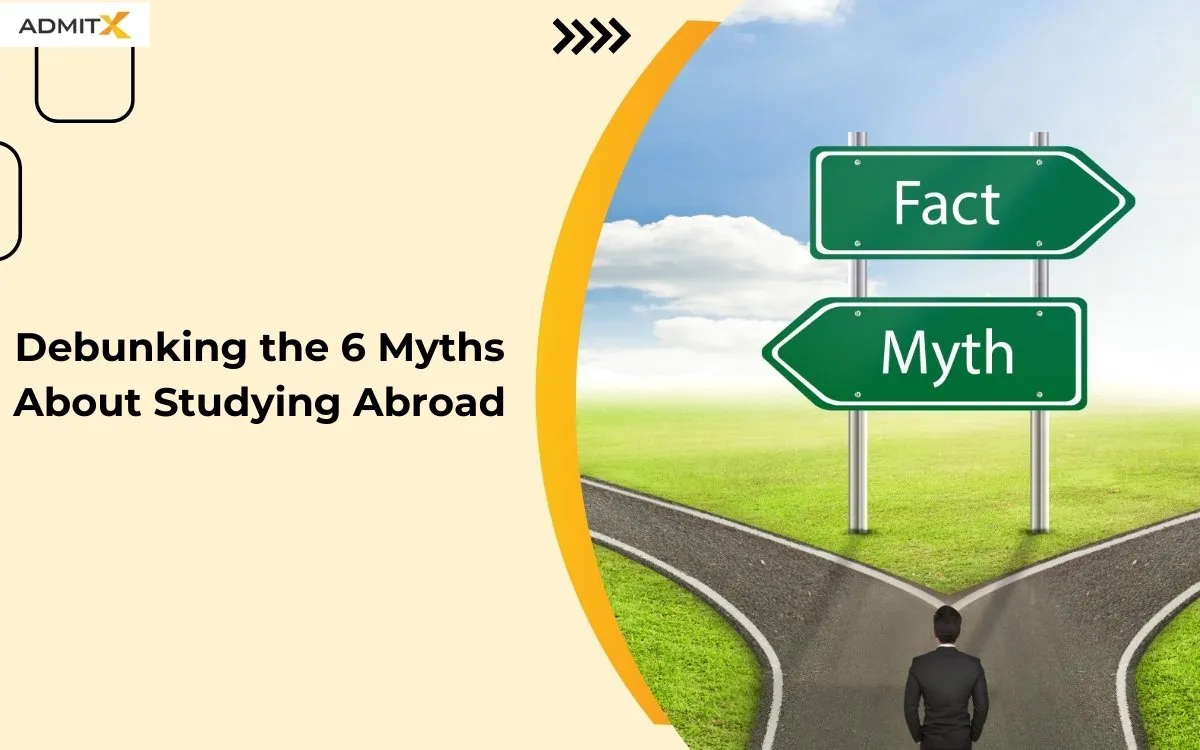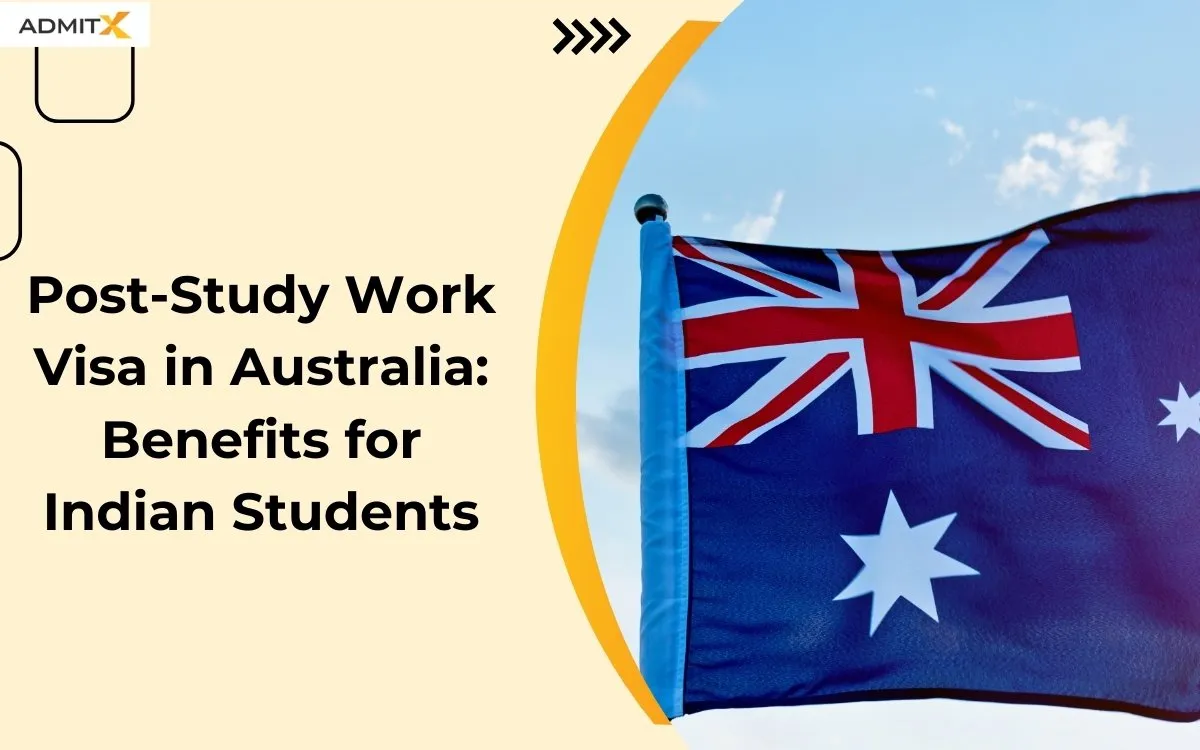
Debunking the 6 Myths About Studying Abroad
For many people, including yourself, studying abroad can seem like a daunting task to undertake. There are numerous myths and misconceptions about studying abroad that may have created obstacles between you and your goals.
Even those who are not interested in pursuing overseas education often claim that it is an expensive endeavour. Others might argue that people go to foreign countries for fun.
- Myth #1: Only a Rich Person/Family Can Afford It
- Myth #2 About Studying Abroad: Foreign Countries Can Ruin Your Moral Values
- Myth #3 About Studying Abroad: Studying Abroad is Only for Academic Brilliant Students
- Myth #4 About Studying Abroad: It is Difficult to Make Friends Overseas
- Myth #5 About Studying Abroad: Overseas Education System is Challenging
- Myth #6 About Studying Abroad: Too Difficult to Adjust
- How AdmitX Can Help You
- FAQs
Myth #1: Only a Rich Person/Family Can Afford It
Reality: Everyone can afford it, despite their financial background, provided they have strategically planned it.
- As overseas education booms, several national and international banks and other lenders have offered various types of financial aid in the form of loans to assist aspirants in fulfilling their dream of pursuing higher education.
- Taking an education loan in India might feel like carrying a burden for many students.
- However, they can easily repay the loan amount as they get a high return on investment through part-time jobs and other career development opportunities.
- A wide range of scholarship options are also available to needy students who want to pursue any type of study program abroad.
- These scholarships and study grants cover the significant expenses that might be incurred.
- They are available as both fully-funded and partially-funded options, depending on the student’s needs.
Myth #2 About Studying Abroad: Foreign Countries Can Ruin Your Moral Values
Reality: Studying abroad provides exposure to diverse cultures and a multilingual population, which develops a global perspective and enhances cross-cultural adaptability.
- The moral values are often shaped by upbringing, education, and personal choices.
- It is totally wrong to interpret that visiting foreign countries to pursue education can ruin moral values.
- Exposure to different cultures enriches our lives as we gain valuable things for ourselves, such as life lessons, adaptability, communication, a sense of brotherhood, etc.
- Also, while studying abroad, individuals face challenges in their everyday lives that prepare them for a better future by inculcating self-independence, resilience, and tolerance.
- Studying abroad also pushes one to think and reflect on their belief system, which enhances their critical thinking.
Myth #3 About Studying Abroad: Studying Abroad is Only for Academic Brilliant Students
Reality: Institutes emphasise the holistic personality of individuals while processing their applications, which also includes their non-academic life and skills.
- Institutes evaluate the academic performance of applicants before granting them admission, but this is only one criteria that does not limit their potential or dream of studying abroad.
- It is a very common myth about studying abroad because many people think that only selective ones, specially those whose minds are god-gifted or unique, are able to pursue overseas education.
- There are many cases where applications of such academically highly talented candidates were rejected despite their top-notch performance in their previous studies or good GRE or GMAT scores.
- International colleges and universities have their own evaluation criteria, which assess the skills and abilities of the candidates, along with their academics.
Myth #4 About Studying Abroad: It is Difficult to Make Friends Overseas
Reality: It is very easy to make friends overseas as they are on the same page with you.
- It is also one of the common misconceptions about studying abroad.
- While studying abroad, students often get different opportunities to engage with people from diverse countries and cultures through academics, internships, part-time jobs, and co-curricular activities.
- This provides them with a space to carefully choose their acquaintances and friends based on their personalities and values.
- Volunteering, cross-cultural activities, workshops, career fairs, etc., can foster meaningful connections between individuals.
Myth #5 About Studying Abroad: Overseas Education System is Challenging
Reality: Challenges are what prepare you to achieve your goals and ambitions.
- The overseas education system helps students foster skills such as critical thinking, research and analytical skills, problem-solving, and leadership.
- The overseas education system is rigorous but flexible, allowing Indian applicants to choose the stream and courses that interest them, even when they have pursued different majors or combinations of subjects.
- The international education system recognises the credentials earned in the Indian education system, facilitating applicants’ smoother transition.
- Academic assessments in overseas universities are conducted holistically and involve classroom participation, project work, research activities, academic tours, etc.
Myth #6 About Studying Abroad: Too Difficult to Adjust
Reality: It is very easy to make friends overseas as they are on the same page with you.
- Going abroad to pursue higher studies for the first time might lead to feelings of awkwardness and being lost due to cultural differences, communication barriers, and different atmospheres.
- However, such conditions allow you to leave your comfort zone and endeavour for the greater good.
- It does not take much time to adjust as you start making new friends and connections; you forget what homesickness and culture shock is.
- Indian students often join clubs and organisations which help them understand the local culture, traditions, and heritage so that they can adapt easily.
How AdmitX Can Help You
AdmitX is one of the fastest-growing overseas education consultancies based in Delhi. We aim to provide comprehensive assistance to Indian applicants who want to fulfill their dreams of studying abroad. Our services also aim to debunk the myths about studying abroad, empowering individuals to achieve their goals. We offer the following services.
- Dedicated Application Coach
- Application Fee Waivers
- IELTS Bootcamp
- Test Discounts (TOEFL, GRE, Duolingo, PTE)
- International Fund Transfers & Forex Card
- Free Guaranteed Scholarship for upto Rs. 2,00,000/-
- Housing Assistance
- Education Loan Assistance
- Student Visa Assistance
FAQs
Is it worthwhile to study abroad?
Studying abroad offers exposure to diverse cultures, a global network of students, top-quality education, and career development opportunities, which enhance the personal and professional growth of the students.
Do employers value study abroad experience?
Yes, employers value the experience gained from studying abroad, such as adaptability, cross-cultural connection, communication, critical thinking, and a research-oriented mindset.
Is a foreign degree valuable in India?
An academic degree earned in a foreign country is highly regarded in India, especially if it is obtained from prestigious institutes since it demonstrates the skills and knowledge gained from global exposure.
Which country is best for Indian students to study abroad?
You should choose a country based on your academic background, interests and passions, goals, location, and budget.
You can explore countries like the USA, UK, Canada, France, Ireland, Germany, etc., since they are world-renowned for providing academic and professional excellence in the desired field.
Where can you check the admission requirements for the preferred course?
You can check the admission requirements for the preferred course on the institute’s official website or contact a trusted study abroad consultancy like AdmitX for guided assistance.







